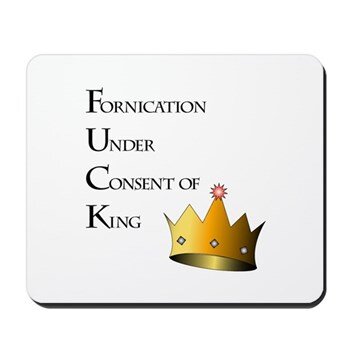The English lexicographer and etymologist Susie Dent was asked online to confirm an old story: that the word “fuck” originated from ancient times when sex was outlawed unless there was explicit consent from the monarch. The decree of “Fornication Under Consent of the King” became “F.U.C.K.”. And thereby hangs a tail.
Dent’s reply: “Sadly, Fornication Under Command/Consent of the King is a much later backronym. The history of fuck is tricksy, but it might be a much-altered version of the Latin ‘pugnare’, to hit or beat - for centuries kestrels were called ‘windfuckers’ because their wings strike the wind.”
I like the Latin origin story way more than the backronym. Kestrels are such romantic, medieval birds to me, and the idea of calling them windfuckers cracks me up. But Dent seemed to sense that her answer might disappoint some of her readers. Acronyms are fun, and “F.U.C.K.” is especially tempting. Because it’s funny to imagine people in Olde Englande going to some crown-wearer to ask for permission to have sex? Or because it’s appealing to think of people resorting to this simple codeword, this quickie, instead of a lengthy royal dictate?
Acronyms are visual engagements with language. They can be fun like codewords are fun. But “fuck” is more likely an old word expressing a physical action or movement whose sound has changed as pronunciations shift and slide around. The engagement is kinesthetic. It is aural; tactile; visceral. We express it in moments of heightened emotion, and research suggests that our impulse to do so comes from the same part of the brain that releases endorphins. Schitt’s Creek’s Moira Rose, after struggling too many times to articulate the name “Herb Ertlinger”, finally bursts out with “BINGO LINGFUCKER!” and we feel her satisfaction. Many, many articles have been written about what happens in the brain when we say the word; or about how saying the word makes us smarter, funnier, better dressed - who knows. But EXPRESSING it, not looking at it.
From the friction of the ‘fff’, to the open vowel, through to that explosive ‘k’. It’s all there. No decoder ring required.
